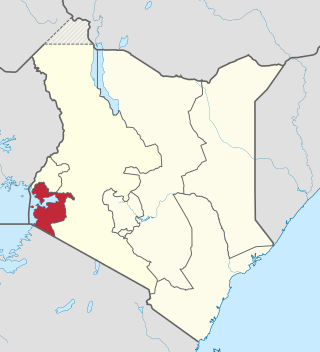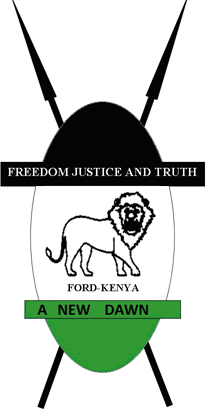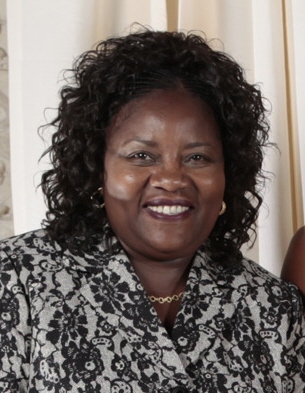Related Research Articles

The Luo are several ethnically and linguistically related Nilotic ethnic groups that inhabit an area ranging from Egypt and Sudan to South Sudan and Ethiopia, through Northern Uganda and eastern Congo (DRC), into western Kenya, and the Mara Region of Tanzania. Their Luo languages belong to the western branch of the Nilotic language family.

Kisumu is the third-largest city in Kenya after the capital, Nairobi, and Mombasa. It is the second-largest city after Kampala in the Lake Victoria Basin. The city has a population of slightly over 600,000. The metro region, including Maseno and Ahero, has a population of 1,155,574 people according to the 2019 Kenya Population and Housing Census which was conducted by the Kenya National Bureau of Statistics.

Thomas Joseph Odhiambo Mboya was a Kenyan trade unionist, educator, Pan-Africanist, author, independence activist, and statesman. He was one of the founding fathers of the Republic of Kenya. He led the negotiations for independence at the Lancaster House Conferences and was instrumental in the formation of Kenya's independence party – the Kenya African National Union (KANU) – where he served as its first Secretary-General. He laid the foundation for Kenya's capitalist and mixed economy policies at the height of the Cold War and set up several of the country's key labour institutions. Mboya was Minister for Economic Planning and Development when he was assassinated.

Nyanza Province was one of Kenya's eight administrative provinces before the formation of the 47 counties under the 2010 constitution. Six counties were organised in the area of the former province.

Forum for the Restoration of Democracy–Kenya (FORD–Kenya) is a Kenyan political party. The party has sat in the government of Kenya once, under the National Rainbow Coalition, from 2003 to 2007, having ended forty years of one party rule. In April 2022, the party joined the Kenya Kwanza coalition for the August 2022 elections, and is headed by Moses Wetangula, the current speaker of the National Assembly of Kenya. The party tends to be more popular among the Luhya people.

The Luo of Kenya and Tanzania are a Nilotic ethnic group native to western Kenya and the Mara Region of northern Tanzania in East Africa. The Luo are the fourth-largest ethnic group (10.65%) in Kenya, after the Kikuyu (17.13%), the Luhya (14.35%) and the Kalenjin (13.37%). The Tanzanian Luo population was estimated at 1.1 million in 2001 and 3.4 million in 2020. They are part of a larger group of related Luo peoples who inhabit an area ranging from South Sudan, southwestern Ethiopia, northern and eastern Uganda, southwestern Kenya, and northern Tanzania, making them the largest ethnic group in East Africa.

Raila Amolo Odinga is a Kenyan politician who served as the Prime Minister of Kenya from 2008 to 2013. He was the Member of Parliament (MP) for Langata Constituency from 1992 to 2013 and has been the Leader of Opposition in Kenya since 2013. He is the leader of Azimio la Umoja–One Kenya Coalition Party.
The Orange Democratic Movement (ODM) is a centre-left political party in Kenya. It is the successor of a grassroots people's movement that was formed during the 2005 Kenyan constitutional referendum campaign. This movement separated in August 2007 into the Orange Democratic Movement Party of Kenya and the Wiper Democratic Movement – Kenya.

Bethwell Allan Ogot is a Kenyan historian and eminent African scholar who specialises in African history, research methods and theory. One of his works starts by saying that "to tell the story of a past so as to portray an inevitable destiny is, for humankind, a need as universal as tool-making. To that extent, we may say that a human being is, by nature, historicus.
David William Cohen is Emeritus Professor of History and Anthropology at the University of Michigan. He specializes in East Africa and is a leader in the emerging field of historical anthropology. He is Honorary Research Fellow, Archive and Public Culture Initiative, University of Cape Town.

Saint Mary's School, commonly known as Saints, is a private Roman Catholic primary and secondary day school for boys located in Nairobi, Kenya.
Lady Whitehouse is a settlement in Kenya's Nyanza Province.

Maseno School, located in Kisumu County in Kenya, is one of the oldest formal education schools in the country.
Phares Oluoch Kanindo was a veteran politician in Kenya. He served as a member of parliament from 1979 to 1988, when the then president Moi prorogued parliament after the attempted 1982 coup. This he served in the larger Homa Bay Constituency, now divided into two constituencies

Ida Betty Odinga is a Kenyan businesswoman, activist and educator. She is the wife of Raila Odinga, the former Prime Minister of Kenya, and the leader of National Super Alliance (NASA). In 2010, The Standard named Odinga, who was one of the first women to head a major Kenyan company, as one of the top most powerful women in Kenya in 2010.

Miguna Miguna is an Advocate of the High Court of Kenya. He practices law as an attorney, a barrister and solicitor in Toronto, Canada. Miguna served as a senior adviser to former Kenyan Prime Minister Raila Amollo Odinga from 2009 to 2011.

Kisumu Rugby Football Club is a Kenyan rugby union club based in Kisumu. Also known as Lakeside RFC, for the 2015–16 season the club competes in the Nationwide League.

The 2018 Kenya handshake was a political truce made on 9 March 2018 between Kenyan President Uhuru Kenyatta and former Kenyan Prime Minister Raila Odinga. The two had been the leaders of opposing political factions amidst widespread political violence and civil unrest; they had previously faced one another in the contested 2017 Kenyan general election. Under the agreement, their political feud with an agreement that Kenyatta would support Odinga in the upcoming presidential elections. Consequently, the Azimio coalition was formed, Uhuru became its chairman, and Odinga became the presidential candidate with Martha Karua as his running mate. They lost to William Ruto, who was then Kenyatta's deputy. They challenged Ruto's victory in the Supreme Court, but Chief Justice Martha Koome said his claims did not meet the evidentiary threshold and dismissed the case. At a March 2023 protest in Nairobi they demanded an audit of the IEBC election servers.
The Luo Union was a welfare organisation formed in Nairobi, Kenya, in the early 1920s. This organisation sought to create, expand and govern a general cultural identity among Luo people in East Africa. Luo people are a Nilotic ethnic group native to western Kenya and the Mara Region of northern Tanzania in East Africa. The Luo Union was one of several welfare organisations started during the colonial period in East Africa which aimed at building broad cultural unity. This organisation played a crucial role in creating a collective sense of identity and unity amongst Luo people after the Second World War. It was also an important medium of grassroots political support for African Nationalist movements in the 1950s. The Luo Union FC was the unions soccer club. This club would later become Gor Mahia FC, one of Kenya's best performing football clubs.
References
- ↑ "Kenya - 2009 Kenya Population and Housing Census (10 Per Cent sample, every 10th household), Population and Housing Census - Overview". statistics.knbs.or.ke. Retrieved 2019-01-31.
- ↑ Cohen, David William (July 1968). "Luo History without Court Chronicles History of the Southern Luo. Volume 1. Migration and Settlement. By Bethwell A. Ogot. Nairobi: East African Publishing House. 1967. Pp. 250. Sh. 20 paper, Sh. 36 cloth". The Journal of African History. 9 (3): 480–482. doi:10.1017/s0021853700008690. ISSN 0021-8537.
- ↑ "Sunday Times Style Magazine October 2017 Cover (The Sunday Times Style Magazine UK)". models.com. Retrieved 2019-01-31.
- ↑ "Biography - Raila Odinga - Presidential Candidate 2013". 2013-02-18. Archived from the original on 2013-02-18. Retrieved 2019-01-31.